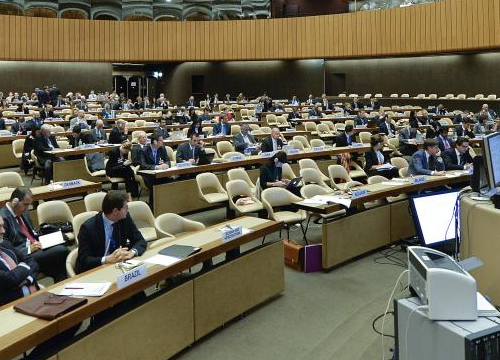Autonomous Weapons Systems: What Constraints under International Law?
Event


UN Photo / Jean-Marc Ferré
A Side Event co-organized with the Swiss Federal Department of Foreign Affairs at the 2017 Group of Governmental Experts on Lethal Autonomous Weapons Systems (LAWS)
What constraints and requirements do international humanitarian and human rights law place on the use and development of autonomous weapons systems? What role for the Convention on Prohibitions or Restrictions on the Use of Certain Conventional Weapons (CCW)?
The 2016 Fifth Review Conference of the High Contracting Parties to the CCW established a Group of Governmental Experts (GGE) on Lethal Autonomous Weapons Systems to explore and agree on possible recommendations on options related to emerging technologies in the area of autonomous weapons systems, in the context of the objectives and purposes of the CCW. The GGE should consider, inter alia, the application of, and compliance with, the relevant legal principles and rules of international law, in particular international humanitarian law (IHL).
With a view to securing and facilitating compliance with international law and building on the previous Informal Meetings of Experts this side event intends to recapitulate relevant existing rules and principles as they apply in relation to autonomous weapons systems.
Based on the research studies ‘Defending the Boundary’ of the Geneva Academy and ‘War-Algorithm Accountability’ of the Harvard Law School Program on International Law and Armed Conflict the event will recall the substantive and procedural constraints and requirements on the use and development of autonomous weapons systems under international humanitarian and human rights law. It will also shed light on foundational protective interests and concerns underlying relevant international legal frameworks, including concepts of responsibility.
Following the presentations, the side event will allow for an exchange on the applicable legal framework, how its rules and principles apply to autonomous weapons systems and how compliance thereto could be ensured.
Moderator
- Nikolas Stürchler, Head of the Section, International Humanitarian Law and International Criminal Justice, Directorate of International Law, Swiss Federal Department of Foreign Affairs FDFA
Panellists
- Maya Brehm, Researcher, Geneva Academy and Advisor, Article 36
- Dustin A. Lewis, Senior Researcher, Harvard Law School Program on International Law and Armed Conflict
Sandwiches and Light Refreshments
Sandwiches and light refreshments will be provided.







